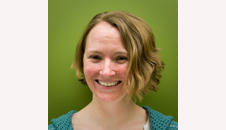Yahoo! Names Three PhD Students as Key Scientific Challenge Winners
Byron SpiceWednesday, May 5, 2010Print this page.

Three PhD students in the School of Computer Science are among the 23 graduate students from 16 universities selected by Yahoo! as winners in the 2010 Key Scientific Challenges program.
Each student submitted a research proposal in one of six challenge areas that Yahoo! considers to be important to the future of the Internet. Moira Burke of the Human-Computer Interaction Institute won for her proposal regarding Microeconomics and Social Systems. Nan Li of the Computer Science Department was recognized for her proposal in Computational Advertising. Vijay Vasudevan, also of the Computer Science Department, submitted a successful proposal for Green Computing.
"As an industry, we're developing the scientific models and disciplines we need to more fully understand and drive the Web's evolution and impact," said Prabhakar Raghavan, Yahoo!'s chief scientist and head of Yahoo! Labs. "This year's Key Scientific Challenge winners all represent innovative, critical research into the new sciences that will shape the next 20 years of Internet innovation."
As was the case last year when Yahoo! inaugurated the program, no other university had as many winners in the program as Carnegie Mellon.
The winners receive $5,000 each in unrestricted seed funding for their research and will also have the opportunity to work closely with some of the world's most well-known and experienced Internet scientists at Yahoo! Labs to advance their research over the next several months.
In September, all of the winners will convene at Yahoo! headquarters in Sunnyvale, California for the Key Scientific Challenges Graduate Student Summit where they will have the opportunity to present and defend their findings to their peers and Yahoo! Labs' leadership in structured workshops.
"It was extremely gratifying this year to see the strength and diversity of our applications," said Ron Brachman, vice president of Yahoo! Labs. "It is clear that the Internet is increasingly central to progress in an amazing number of fields, and the quality of students we've met through the Key Scientific Challenges program is remarkable."
For more information on the Key Scientific Challenges program, see the program's website http://labs.yahoo.com/ksc and the Yahoo! blog, http://ycorpblog.com.
Byron Spice | 412-268-9068 | bspice@cs.cmu.edu
